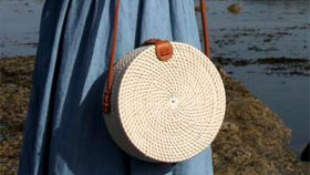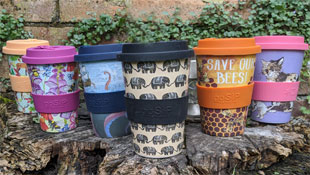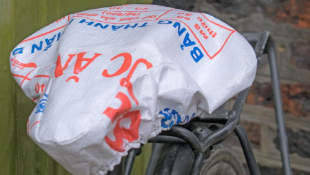ENVIRONMENTAL POLICY
Our Mission Statement: - Shared Earth sells Fair Trade, recycled, eco-friendly and ethical products. Its mission is to tackle the climate crisis and create a fairer, more sustainable world.
Fair Trade and environmental issues are closely interlinked. The problems caused by the climate crisis, in particular, affect countries in the South far more than those in the North; tackling it is a top priority. Significant impacts Our Environmental Policy is based on where we can be most effective in achieving our aims – our ‘significant impacts’. These are listed in terms of priority; a low priority does not mean that we ignore these areas, simply that they have less potential for reducing carbon emissions or other environmental damage. Starting with our overseas activities, these are: - The raw materials used to make the products we buy and sell High
- The way they are transported from their origin through to the final customer High
- The production processes used High
- The packaging used Medium
- The waste created in the production process, and its treatment Medium
Next we consider the carbon emissions we create in the UK: - Travel overseas Medium
- Travel and transport to our customers, trade shows, warehouse etc Medium
- Heat and lighting in our office Low
- Waste and recycling in our office Low
- Heat and lighting at UK warehouse Low
- Packaging and waste at UK warehouse Medium
Finally, we consider the impact our policies, actions and awareness raising may have on customers, suppliers, staff, other businesses, decision makers and the general public High Our overall aim is to strike a balance between environmental, social and economic responsibilities and always to improve environmental standards within the company, our key aim being – to tackle climate change. Specific policies Raw materials - We favour products made from recycled or upcycled materials.
- As far as possible, products should be long-lasting, easy to repair and easy to dispose of.
- If not recycled or upcycled, materials should be sustainable (“meeting the needs of the present without compromising the ability of future generations to meet their own needs”) – such as wool, jute and soft woods.
- They should be sourced locally if possible.
- They should support biodiversity and not harm local eco-systems.
- Timber policy: Our policy (both overseas and in the UK) is to use soft woods (grow to maturity in less than 10 years), wood from sustainable plantations, recycled, reclaimed or fallen trees, or products using eg bark or twigs which can be used without harming the tree concerned. FSC certification is a bonus. We do not sell products made from protected species without a licence, or those listed in CITES endangered species regulations, even where these have been granted limited licenses, at all. We favour fast-growing softwoods such as mango and albesia. We recognise the problem that small producers often buy their wood in local markets, and cannot identify its exact source.
- Paper: We favour the use of handmade papers. If normal paper is used, it should if possible either be FSC certified (preferably 100%), or better, recycled.
- Textiles: Because of the water and land required to grow cotton, we prefer textiles like jute and bamboo, which also grow faster and need fewer or no pesticides. We avoid cotton (including organic), but recognise it’s a major raw material for many producers. Our policy is to keep it to under 2% of our total purchases, by weight.
- We do not source products made with cotton from Uzbekistan, Turkmenistan or Xinjiang or anywhere where there are concerns about forced labour.
- Dyes and paints: We expect natural vegetable dyes and paints to be used where possible.
- Palm oil: Our aim is only to use sustainable palm oil in products, preferably RSPO certified which are certified on a ‘segregated’ or ‘identity preserved’ basis, rather than ‘mass balance’ or using ‘credits’.
- Plastics: We aim to reduce the use of plastic in the products we buy, unless it is recycled plastic, which we encourage. For instance, we are phasing out the use of glitter, sequins and acrylic.
- Metals: All jewellery or products in regular contact with the skin should be lead, nickel and cadmium free.
- Toxic chemicals should not be used under any circumstances.
Production processes - We try to work with suppliers to ensure production methods are appropriate to the ecology and economy of their country of origin, avoiding pollution, protecting fresh water sources and not damaging the local environment.
- We favour small producers whose energy usage is likely to be low, hand crafted products, and we encourage all producers to reduce their carbon emissions where possible.
Transportation overseas and to the UK - Globally, 80% of the energy we use comes from burning fossil fuels, and the biggest carbon saving we can make is by reducing this. Our aim is therefore to minimise the environmental effect of the transport of our products and in particular to become carbon-neutral by 2027.
- We use biofuels to neutralise the carbon emissions of our overseas shipments, sea or air, from port of origin to our warehouse. These biofuels are waste and residue-based. They do not compete with food production, and do not involve changes in land use, deforestation or biodiversity loss.
- We aim to neutralise emissions caused by transport from production site to overseas port, by buying biofuels for use on other vehicles, on the ‘mass balance’ principle, or by carbon offsetting by planting trees.
- We ship products to the UK by sea rather than air. There are some exceptions to this such as samples; very light products; products from countries which do not have access to the sea; occasional urgent orders.
Packaging - Suppliers should minimise packaging, whilst allowing for adequate protection against damages.
- Our suppliers should use plastic only when absolutely necessary; even for fragile ceramics, we favour shredded paper or other eco-friendly alternatives.
- Suppliers should never use thermacol; shredded paper or corn chips should be used instead of plastic chips; plastic strapping should not be used on boxes.
- We try to replace single-use plastic bags with paper or compostable alternatives. If products need to be protected from mould, we request one large plastic bag holding multiple quantities, instead of individual bags.
Waste - We expect our suppliers to avoid contaminating soil or water by ensuring that waste is treated responsibly.
- Suppliers are instructed that toxic or hazardous chemicals should be avoided at all costs in the extraction, growth or processing of raw materials.
- Suppliers should use credible and legally compliant methods of disposal.
- We encourage suppliers to use textile, paper and other offcuts as fillings for other products, or to make new products with them. We follow the ‘waste hierarchy’: minimise first; then re-use; then recycle.
Travel to overseas - Our aim is to avoid flying as much as we can by reducing overseas trips to a minimum.
- For visits to Europe, we generally try to travel by train or other public transport, not by air.
Travel and transport in the UK - For staff travel we always use public transport if at all possible.
- For distribution in the UK, we aim to use companies which have strong environmental policies, eg they use electric vehicles.
- We favour companies which can provide data on CO2 emissions, so we can offset the emissions on the shipment of orders from our warehouse to our customers.
Heat and lighting - We try to minimise energy usage, eg turning lights and computers off when not in use, using standby on our photocopier.
- We try to ensure that replacement electrical items are as fuel efficient as possible.
- We close the door to our shops on cold days, rather than leaving them open (with heaters on) as we used to do and as is the case in many shops.
- We provide staff with jumpers at cost price and encourage them to move away from the engrained habits in our culture of having heaters on, whether they’re needed or not.
Waste and recycling in our office - We try to minimise usage, for instance by double-sided printing, and waste, by keeping mailing lists up-to-date and reducing junk mail.
- We recycle as much as possible including paper, glass, tin, plastic, old pens, crisp packets and all compostable matter.
- Plastics policy: Our policy is to minimise the use of single-use, non-compostable plastics in packaging and eventually to avoid it entirely, replacing it with paper or other alternatives which biodegrade quickly (whose production should not affect land rights or compete with food crops). If plastic is used, it should include as high a content of recycled material as possible, and should be printed with the OPRL (on-pack recycling label) to aid recyclability.
Heat and lighting at warehouse - As our distribution is sub-contracted, our warehouse is run by another business. Within these limits, we encourage energy use to be minimised. Apart from a small office, the warehouse is unheated.
Packaging and waste at warehouse - As many boxes from incoming orders and as much waste as possible should be re-used.
- We use eco-friendly bubble wrap and corn starch, not plastic chips.
- We are constantly on the watch for better eco options and as long as they are decent quality we will choose them even if the price is higher (within reason).
Cruelty-free - None of the products we sell, or their ingredients, has to our knowledge been tested on animals.
Awareness raising - We aim to promote the environmental agenda, and especially the urgent need for action on climate change, as widely as possible, in particular within the Fair Trade movement. We want everyone to better understand the impact on the world of waste, use of fossil fuels, and over-use of resources.
- By insisting on better eco options, especially in raw materials and packaging, we encourage our suppliers to change their practices not just for ourselves but for all their customers.
- We use trade shows, catalogues, newsletters and social media to inspire our customers and encourage them to do all they can to tackle climate change.
- We will ensure that our staff are aware of this Policy and do all they can to further it.
- Some of our products support campaigns to recycle, save endangered species, avoid plastic or other causes which we stand for - such as our 'save our bees' shoppers and 'avoid plastic' solid shampoos.
Legal - Our policy is to comply with all relevant legislation within the UK.
Charity donations - Capacity building of our suppliers is a key aim, for instance Shared Earth UK gave a grant of £8,000 in 2022 to our producer groups in Bali for more efficient machinery and tools.
- Our charity donations should favour causes which support the environment as well as people, for instance the Joliba Trust (desert reclamation and planting trees, Mali) and Sungai Watch (river barriers to stop plastic entering the ocean, Bali).
- Both Shared Earth UK and our shops frequently donate products to charities for raffles and other fund-raising events.
This is a joint policy applying to Shared Earth UK (wholesale), Shared Earth York (retail) and Shared Earth Liverpool (retail) It forms part of our Environmental Management System (EMS). This consists of: this Policy; a plan for achieving our aims, regularly updated; monitoring of progress to see how far we are meeting our targets. Our aim is a biennial review, to tie in with our WFTO Guarantee System process.
Last reviewed: April 2025 |





















